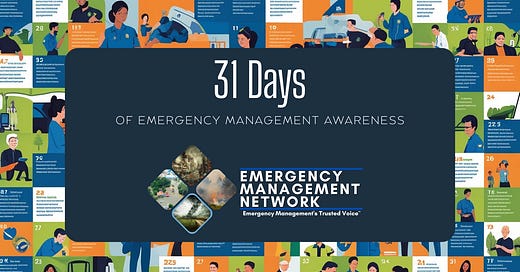August 24th - Consequence Management
Our 24th day of our advocating for the "August is National Emergency Management Awareness Month" campaign highlights the concept of Consequence Management, a subset of Emergency Management.
As part of the “August is National Emergency Management Awareness Month” campaign, originated by the IAEM-USA, to raise awareness of the field of professional Emergency Management (as well as better describe what Emergency Managers do, don’t do, etc.), we bring you our take on 31 Days of Emergency Management Awareness.” Today’s post - for Day 24 - is about Consequence Management.
These posts are designed for the general public, folks beginning their education and/or careers in Emergency Management, local politicians, community leaders, etc. We figure there are a ton of questions about what Emergency Management is all about, and since we have a open mic and platform to help explain all of it, here goes.
By
- subscribeConsequence Management - sometimes called Contingency Management as well - is planning for the “what if’s” associated with event management. Usually it is large scale events, but it can also apply to local events as well. The event management is the ‘run of show’ and may in fact utilized Emergency Management practices.
But when the you know what hits the fan, that is when the consequence management planning becomes incident action planning.
Events - everything from a neighborhood street fair to the U.S. Presidential Inauguration - need to be planned for the “what-if’s” which can turn a good day into a very bad one. And sometimes it starts with a bad day or worse, and those events afterwards need consequence management even more.
Here are some examples (and you can find more AAR/IPs here) of abject failures in event planning and execution, to protect the LIPER priorities through consequence management:
The protests and subsequent murder of Ms. Heather Heyer and injuring 35 people in Charlottesville, NC in 2017. This was not only a failure to utilize Emergency Management, but any emergency or consequence management principles at all.
The nationwide protests and subsequent riots in many cities after the murder of Mr. George Floyd in Minneapolis, MN in 2020. The After-Action Review from the Minneapolis initial incident shows failures in consequence management planning which cost lives and millions of dollars in losses. Many communities around the country struggled with sudden peaceful protests which overwhelmed their emergency services resources, and compromised the LIPER in the process.
The routine event of the official Electoral College vote count and certification of the U.S. Presidential Election in 2021, cascaded into incidents of missed intelligence sharing, adjacent real bomb threats, and the attack on the U.S. Capitol. Failures of Unity of Effort, Unified Command, and other Emergency Management, has been documented as well.
National events of scale can receive a Special Event Assessment Rating (SEAR) by the U.S. Department of Homeland Security, if they are submitted. Some - especially involving the President of the United States or any other country’s head of state - may even require the U.S. Secret Service to take the lead as the Federal Coordinating Officer. Those are National Security Special Events, and they always have consequence management planning and execution.
31 Days of Emergency Management Awareness
As part of the “August is National Emergency Management Awareness Month” campaign, originated by the IAEM-USA, to raise awareness of the field of professional Emergency Management (as well as better describe what Emergency Managers do, don’t do, etc.), we bring you our take on







